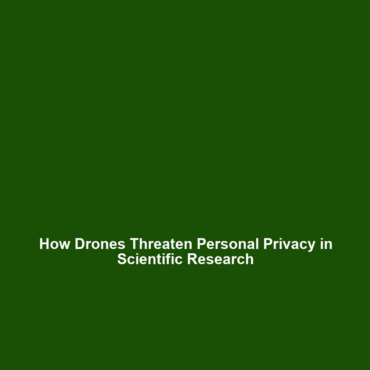How Drones May Infringe on Personal Privacy in Research Applications
Introduction
The proliferation of drone technology is reshaping various fields, including scientific research. However, as drones in science gain prominence, concerns about how drones may infringe on personal privacy in research applications are emerging. This issue is significant as it touches upon ethical considerations and the safeguarding of individual rights while leveraging advanced technologies for scientific gains. This article delves into the essential aspects of drone usage in science and the privacy ramifications inherent in these applications.
Key Concepts
Privacy Infringement
At the intersection of drones in science and personal privacy, privacy infringement concerns primarily revolve around the capabilities of drones to collect extensive data, including video and photographs, without the consent of individuals. Understanding privacy laws, ethical research practices, and drone technology’s capacity for surveillance is crucial in mitigating potential risks.
Research Applications
Universities and research institutions frequently employ drones for environmental studies, wildlife tracking, and urban planning. However, these research applications raise critical questions regarding how drones may infringe on personal privacy, especially in populated areas or regions where individuals expect a degree of privacy.
Applications and Real-World Uses
The implications of drone technology on personal privacy manifest in several ways:
- Environmental Monitoring: Drones are increasingly used for monitoring ecosystems. However, this data collection can unintentionally capture personal activities.
- Surveillance in Urban Areas: Research involving urban heat mapping or traffic monitoring often intersects with residential privacy.
- Wildlife Studies: While studying wildlife behavior, drones can incidentally record the activities of people nearby, leading to privacy concerns.
Current Challenges
Several challenges exist in the study and application of how drones may infringe on personal privacy in research applications:
- Lack of Comprehensive Regulations: Many countries lack specific regulations governing drone usage in research contexts.
- Public Awareness: Limited public understanding of drone technology contributes to heightened fears regarding surveillance.
- Ethics in Research: Ethical guidelines on consent and privacy in data collection are often vague or inconsistent.
Future Research and Innovations
The future of drones in science and their implications for personal privacy may transform with upcoming innovations:
- Enhanced Privacy Features: Innovations such as real-time data encryption and selective data collection could mitigate privacy concerns.
- AI and Machine Learning: These technologies may allow drones to autonomously avoid capturing personal data while conducting research.
- Regulatory Developments: Expect ongoing dialogue around developing frameworks to safeguard individual privacy in drone applications.
Conclusion
In conclusion, the intersection of how drones may infringe on personal privacy in research applications and drones in science presents a complex challenge that must be navigated thoughtfully. As the field progresses, it is imperative to strike a balance between scientific advancement and the protection of individual privacy rights. Engaging with public discourse and advocating for stronger regulations will be vital for ensuring the responsible use of drone technology. For more information, consider exploring related topics on privacy concerns in technology and drone regulations worldwide.

